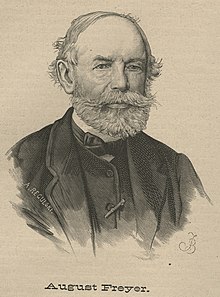
August Freyer (15 December 1801 – 28 May 1883) was a Polish musician and composer, specializing in both performance and composition on the organ.

August was born in Saxony in 1801. [1] [2] He moved to Warsaw and began his musical career there as a double bass player. [3] He became organist at the Warsaw Evangelical Church, had the organ rebuilt, and turned his church into a prominent musical location [3] while becoming the prominent organist and organ teacher in Warsaw. [2] He made a tour of northern Germany as an organist, from which he received wide acclaim. [2]
August was a musical pupil of Józef Elsner. [4] He became a close associate of Adolf Friedrich Hesse. He promoted Hesse's music to Mikhail Glinka, successful in his performance to the point of reducing his listener to tears. [5] At an early age Stanisław Moniuszko became his pupil, his parents relocated to Warsaw to have Stanisław study with Freyer. [4] He died in 1883. [6]
Freyer was largely responsible for the revival of organ music in Poland. [6] He was a master at music balance, both homophonic and polyphonic. [3] His playing was appreciated by Felix Mendelssohn and Louis Spohr. [3] In addition to the aforementioned German concerts, he toured Paris to an enthusiastic reception. [6] His most famous composition was a set of Concert Variations of which the final-movement fugue is the most recognized. [6]
- ^ Michael F. Runowski : Ein deutscher Pole oder ein polnischer Deutscher? Leben und Werk von August Freyer. In: „organ“ 4/2003, S. 16ff
- ^ a b c Samuel, Thomas (July 1, 1918). "A Psychological Problem Made in Germany". The Musical Times. 59 (905): 320.
- ^ a b c d Johnson, Keith. "August Freyer Biography". AllMusic. RhythmOne group. Retrieved July 30, 2016.
- ^ a b Greene, David Mason (1985). Greene's Biographical Encyclopedia of Composers. Reproducing Piano Roll Fnd. p. 641. ISBN 9780385142786.
- ^ Stinson, Russell (2012). J. S. Bach at His Royal Instrument: Essays on His Organ Works. p. 116. ISBN 9780199917242.
- ^ a b c d Golos, Jerzy (1969). Program Notes: Polish Organ Music of the Romantic Era (12-inch vinyl LP) (phonograph record). Orpheus. LCCN 77-750952. OCLC 3265273. OR 362.
- Scores by August Freyer in digital library Polona

August Freyer (15 December 1801 – 28 May 1883) was a Polish musician and composer, specializing in both performance and composition on the organ.

August was born in Saxony in 1801. [1] [2] He moved to Warsaw and began his musical career there as a double bass player. [3] He became organist at the Warsaw Evangelical Church, had the organ rebuilt, and turned his church into a prominent musical location [3] while becoming the prominent organist and organ teacher in Warsaw. [2] He made a tour of northern Germany as an organist, from which he received wide acclaim. [2]
August was a musical pupil of Józef Elsner. [4] He became a close associate of Adolf Friedrich Hesse. He promoted Hesse's music to Mikhail Glinka, successful in his performance to the point of reducing his listener to tears. [5] At an early age Stanisław Moniuszko became his pupil, his parents relocated to Warsaw to have Stanisław study with Freyer. [4] He died in 1883. [6]
Freyer was largely responsible for the revival of organ music in Poland. [6] He was a master at music balance, both homophonic and polyphonic. [3] His playing was appreciated by Felix Mendelssohn and Louis Spohr. [3] In addition to the aforementioned German concerts, he toured Paris to an enthusiastic reception. [6] His most famous composition was a set of Concert Variations of which the final-movement fugue is the most recognized. [6]
- ^ Michael F. Runowski : Ein deutscher Pole oder ein polnischer Deutscher? Leben und Werk von August Freyer. In: „organ“ 4/2003, S. 16ff
- ^ a b c Samuel, Thomas (July 1, 1918). "A Psychological Problem Made in Germany". The Musical Times. 59 (905): 320.
- ^ a b c d Johnson, Keith. "August Freyer Biography". AllMusic. RhythmOne group. Retrieved July 30, 2016.
- ^ a b Greene, David Mason (1985). Greene's Biographical Encyclopedia of Composers. Reproducing Piano Roll Fnd. p. 641. ISBN 9780385142786.
- ^ Stinson, Russell (2012). J. S. Bach at His Royal Instrument: Essays on His Organ Works. p. 116. ISBN 9780199917242.
- ^ a b c d Golos, Jerzy (1969). Program Notes: Polish Organ Music of the Romantic Era (12-inch vinyl LP) (phonograph record). Orpheus. LCCN 77-750952. OCLC 3265273. OR 362.
- Scores by August Freyer in digital library Polona